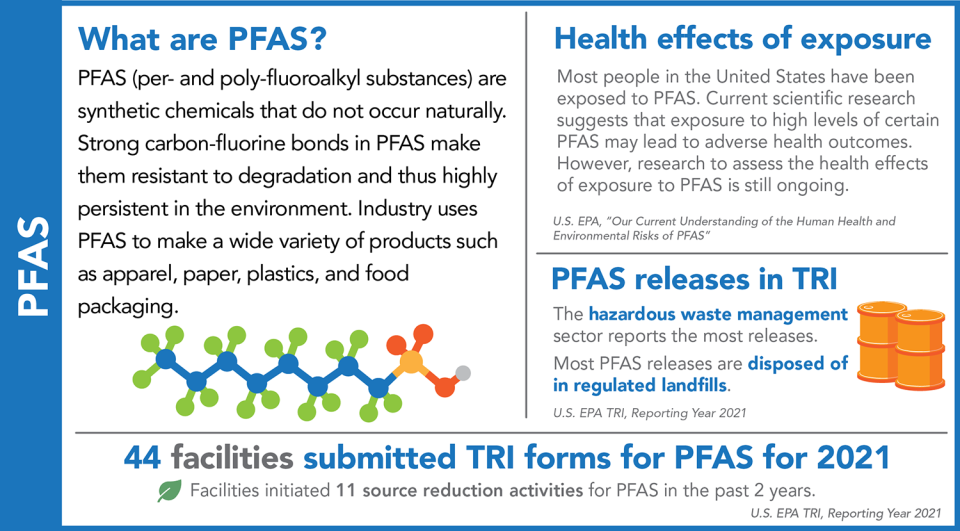
EPA gets tougher on PFAS, TCE
Submitted by:
Andrew Warmington
The US Environmental Protection Agency (EPA) has removed an exemption for per- and polyfluoroalkyl substances (PFAS) reporting, requiring companies to submit data on products containing any level of PFAS to the Toxic Release Inventory (TRI) each year. Previously, those containing minimal concentrations of PFAS were exempt.
As a result, the agency will require manufacturers and importers of PFAS and PFAS-containing articles to provide information on uses, amounts produced, by-products, potential toxicity and exposures, and disposal methods for PFAS in their products or processes. They must also do this retrospectively to 2011 if such information is available.
The final rule, which was issued on 28 September, gives manufacturers 18 months to provide the required information. Small manufacturers have 24 months to report PFAS in imported articles. The EPA uses data to like this to inform local governments agencies and people about how facilities in their area are managing listed chemicals.
The rule also widened the definition of PFAS to include about 100 chemicals that are persistent in the environment, including substances with non-adjacent fluorinated carbons and unconnected CF2 or CF3 moieties, and high molecular weight fluoropolymers. This brings the total number of PFAS subject to reporting requirements to at least 1,462, with a combined compliance cost of over $800 million.
Observers believe that this could have significant supply chain impacts, notably on small companies who now have reporting obligations and may be unaware of this. In addition, those who buy mixtures containing PFAS, however small, will receive notification of it and are likely to put pressure on suppliers to reformulate.
The EPA has also announced a proposed ban on all uses of trichloroethylene (TCE) under the Toxic Substances Control Act (TSCA). If this is ultimately approved, it would be implemented in one year for all consumer and most commercial and industrial uses, and phased in over a longer period for the rest.
TCE is highly toxic and involved in serious health risks including cancer, neurotoxicity, and reproductive toxicity, the EPA stated. Its main applications include cleaning and furniture care products, automotive care products such as brake cleaners, plus spray coatings for uses in arts and crafts.
While environmental groups welcomed these move, the American Chemistry Council (ACC) expressed concern. It described the proposed PFAS rule as “another step in the concerning trend of regulatory overreach by this EPA”, representing “an unprecedented request for information, both in terms of the amount and type of data requested as well as the number of years subject to reporting”.
The TCE proposal, the association added, is “inconsistent with the underlying science” and could unnecessarily restrict small-volume uses in packaging, formulation and as a solvent. “If EPA decides to move forward with restrictions on consumer uses of TCE, it is important that it does not unnecessarily restrict valuable industrial use."
The ACC had also recently launched an initiative called ‘Chemistry Creates, America Competes’. This came in direct response to what it regards as the Biden administration’s ‘regulatory overreach’ and aims to help the administration and Congress understand the importance of ‘American Chemistry’.
“Computer chips, medicines, housing, infrastructure, and energy are all made possible by America’s chemical industry,” said Chris Jahn, president and CEO. “Unfortunately, a surge in unduly restrictive regulations and a lack of coordination in the Biden administration is putting it all at risk.”
The association highlighted new proposed restrictions that could limit access to, and significantly increase the cost of, essential products. Some of these, it said, propose bans or regulate specific chemicals at such low levels that manufacturing becomes virtually impossible. It called for:
* The Office of Management & Budget to be empowered to evaluate all significant rulemaking through the lens of potential impacts to the supply chain, trade, national security, energy, climate, healthcare, infrastructure, technology, etc.
* Someone with economic expertise to be assigned, preferably within the White House, who can objectively assess the impact of proposed regulations on the supply chain and the ability to achieve national goals
* Congress to examine how overly conservative regulations could cut off access to products and technologies needed to support US-made energy, vehicles, infrastructure, healthcare and semiconductors
* If necessary, Congress to consider legislation to improve the regulatory process, streamline permits and focus regulations on “more flexible, smart, science-based policy approaches”
